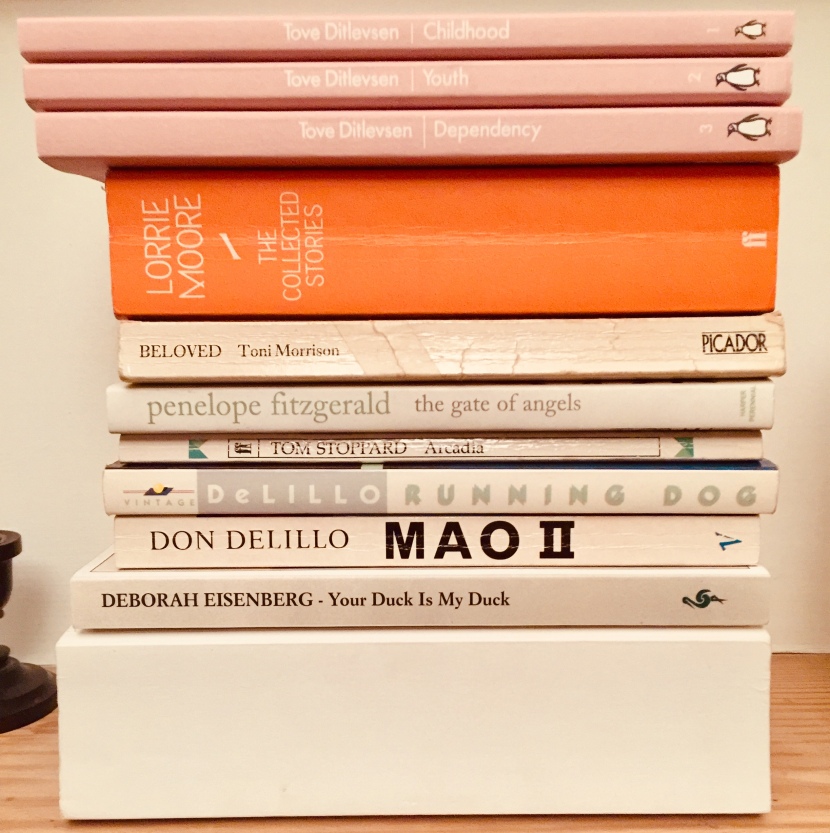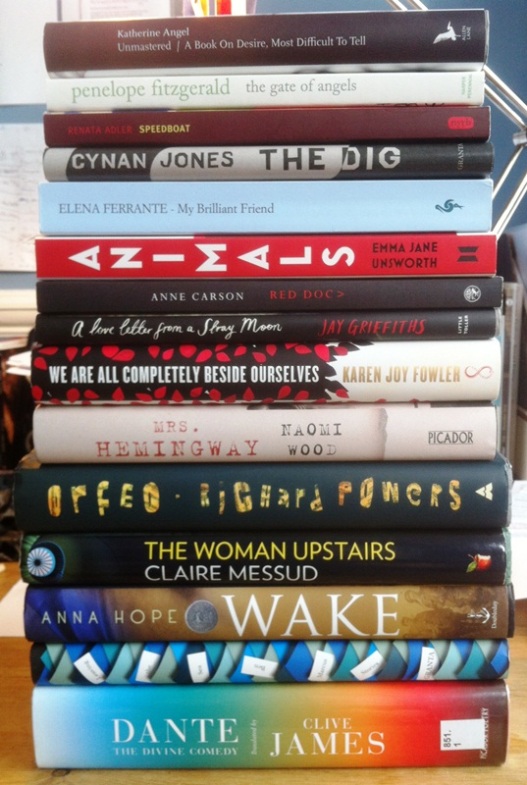Tagged: Penelope Fitzgerald
August Reading: DeLillo, Ditlevsen, Eisenberg, Ellmann, Moore, Morrison, Proust
 (What a pleasingly alliterative set of author names)
(What a pleasingly alliterative set of author names)
There’s an epigraph that I often remember, from Dave Eggers’ debut A Heartbreaking Work of Staggering Genius (2000 – and boy I wonder if anyone’s read or reread that book recently. It would be an interesting experience.) In fact the book has two memorable epigraphs: firstly, ‘THIS WAS UNCALLED FOR.’; and, secondly:
First of all:
I am tired.
I am true of heart.
And also:
You are tired.
You are true of heart.
Both of them sum up the radical sincerity and potential mawkishness at the heart of his writing. Both, because of this, are memorable. They stay with me, because as statements they are so widely applicable – they are applicable now – as well as being pertinent to the book for which they act as curtain raisers, or perhaps, rather, mottos painted on the safety curtain of the book’s theatre.
I am tired. Teaching starts next week. Summer’s over. I am sure that you are tired. I make no claims for the trueness of either of our hearts, but let’s accentuate the positive.
I am tired. That’s it. That’s the tweet.
And but so:
Books are wonderful relaxation. They are also wonderful energising. There’s nothing I love more than grabbing my phone to tweet a response to something I’m reading, whether it’s Don DeLillo describing a woman putting a condom on a man’s penis as “dainty-fingered and determined to be an expert, like a solemn child dressing a doll”,
No big deal, just a DeLillo sentence describing someone putting a condom on a penis. Fuck sake, Don. pic.twitter.com/i5oBTEN1ly
— Jonathan Gibbs (@Tiny_Camels) August 31, 2019
or Lorrie Moore pole-axing the reader with the devastating end to the first page of her story ‘Terrific Mother’.
Here is the first page of ‘Terrific Mother’. Who else would *dare* to open a story like that? pic.twitter.com/vr4qFHJFXR
— Jonathan Gibbs (@Tiny_Camels) August 22, 2019
I’ve been trying to read Proust with my phone to hand, too, as an enhanced form of annotation, and that, too, has been fun and exciting.
Fun and excitement: wow. That’s it. That’s the tweet.
But, sometimes, writing about books can be a chore. It’s a terrible thing that a book, once read, even a good book, can be put on one side and forgotten. What’s the point of all of this, you think, if a book that engages your brain and emotions over a number of hours over a number of days just gets put back on the shelf and, to all intents and purposes, forgotten? Because sometimes they are picked up again. Sometimes they are passed on. My August reading contained left-turns and blind alleys, slogs up stony hills and brief gleefully shrieking slides down sandy dunes. There was reading for work, reading for the soul, reading by accident and reading by design.
The Don DeLillos are there for an academic chapter I’m writing, and I found myself zooming through them. Mao II, a re-read, is far from my favourite of his novels: too slick and portentous, too glib in the way it throws around its themes.
In one aspect at least it’s a victim of its success. The famous riff about terrorists having replaced the novelists at the heart of the inner life of the culture is blandly prophetic, but it’s too on the nose. The other ‘prophetic’ moments or images in his novels – such as the most photographed barn in America, or the playing dead response to the Airborne Toxic Event, are more oblique, more generally symbolic. The writing is spiffing. It’s spiky poetry has just become too easy to read.
Running Dog, by contrast, I enjoyed. I don’t think I’d read it before. It’s more corny in its plotting – closer to a spy thriller or a contemporary hardboiled thriller – and that allows the author to have more fun, and for the punchier writing to stand out from the more familiar skeleton. Another extract I tweeted managed to pick out something that occurred to me elsewhere about the male (I think) approach to language. Here it is: Continue reading
A year in reading: 2014

I haven’t been keeping a strict list of books read during 2014 so this won’t be a strict list of best books, but rather a recollection of the most memorable reading experiences. Which itself leads to an interesting question. How much does a book have to stay with you after finishing it for it to be a good book? I ended my TLS review of Mary Costello’s remarkable Academy Street with the observation that I wasn’t sure if Tess was “the kind of character to stay with the reader long after the book is closed, but during the reading of it she is an extraordinary companion.”
I was discussing the book with David Hayden of Reaktion Books, and the name Deirdre Madden sprung up, whose latest novel Time Present and Time Past I’d just read. I said that I’d hugely enjoyed her earlier book Molly Fox’s Birthday, and that although that judgment stood – that it was a good book – I honestly wouldn’t have been able to tell you anything that happened in it at all.
What books have stayed with me, then? For new novels, Zoe Pilger’s helter-skelter semi-satire Eat My Heart Out and Emma Jane Unsworth’s more groundedly rambunctious Animals both offered up visions of contemporary Britain that I found winning and accurate, or appropriately overdone. Unsworth’s had the thing I thought Pilger’s lacked (though there was more at stake in Pilger) – a sense of where the character might be heading at the end of the dark trip of the narrative. Thinking back on Pilger’s book now, it occurs to me – and I wonder if it’s occurred to her– that Anne-Marie would make a superb recurring character. She’s great at showing where London is, a decade or so into the century. She’d be a useful guide to future moments, too.
The characters I spent the most time with over the year were Lila and Elena from Elena Ferrante’s Neapolitan novels, aka My Brilliant Friend. I read the first volume early in the year, having been previously blown away by the gut punch/throat grab/face slap of The Days of Abandonment. I read the second and third Neapolitan volumes on holiday in the summer. I was reviewing it, so my proof copy is full of scribbles, but the scribble on the final page of Those Who Leave and Those Who Stay says just: ‘Wow’. As has been said before, these books do so many things – European political history, female friendship, anatomisation of Italian society, child to adult growth and adult to child memory – but it does two things that I found particularly powerful. Continue reading
February and March Reading: Messud, Powers, Ferrante, Adler, Fitzgerald, Angel
I am bad. This is old. We are going back to early February here. I’ve been reading, but I’ve not got round to writing any of it up. There are two reasons for this, beyond sheer laziness. One of them is that I wanted to use one of these month’s round-ups to reconsider the whole ‘reading women writers’ / #ReadWomen2014 thing, which beyond being a prompt to myself to read more women was originally supposed to be a prompt to thought: not just why don’t I read more of them, but why do I read them as women; why when I’m reading them am I aware, at some level, of treating them, in my reading, as women writers, not male writers.
Is this true? Or do I just worry that it’s true?
Is awareness thought?
Am I turning into my own thought police?
Do I cut male writers more slack than women, or do I genuinely prefer male writers to women (my personal pantheon of contemporary writers, as I said before, starts with Geoff Dyer, Javier Marías, Knausgaard, Foster Wallace, Nicholson Baker… and goes through a few more, probably, before it hits Lorrie Moore, Lydia Davis.
And of course you’re entitled to question the very idea of the pantheon as a method of literary assessment.)
So, the four months I spent reading women last year was supposed to end with some kind of accounting of that experience, and it never did. I wanted to include that in my Feb reading post, but wasn’t ready to, hadn’t marshalled my thoughts.
I’m not ready now.
I have not marshalled my thoughts. Continue reading
